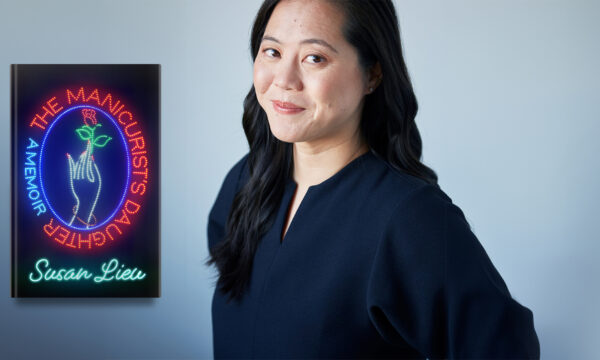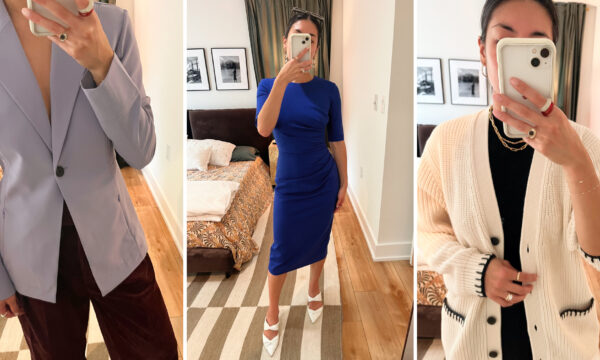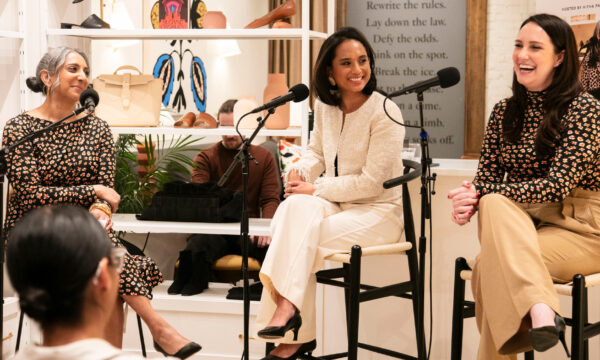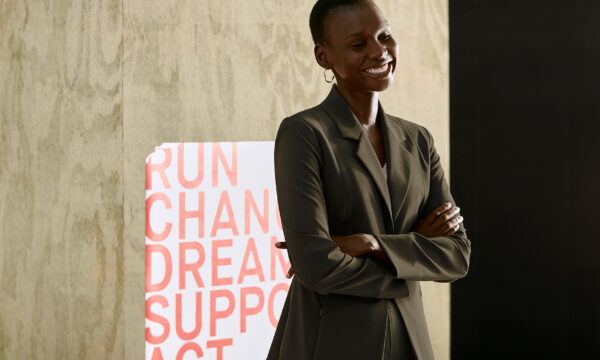
Shop This Look
How to Quit: Talking Pivots, Break-Ups, and Boundaries with the justUS Podcast
From giving up smoking to leaving hard-earned jobs, the hosts of the justUS podcast open up about what, when, and why they’ve chosen to quit.
Quitting—jobs, relationships, bad habits—is sometimes necessary but never easy. It rarely feels like the ideal time, and when you do take the plunge, you inevitably leave a part of your former self behind. To complicate these difficult decisions even further, the path to quitting looks different for everyone—which is precisely why we wanted to tackle the topic at our recent event with the justUS podcast.
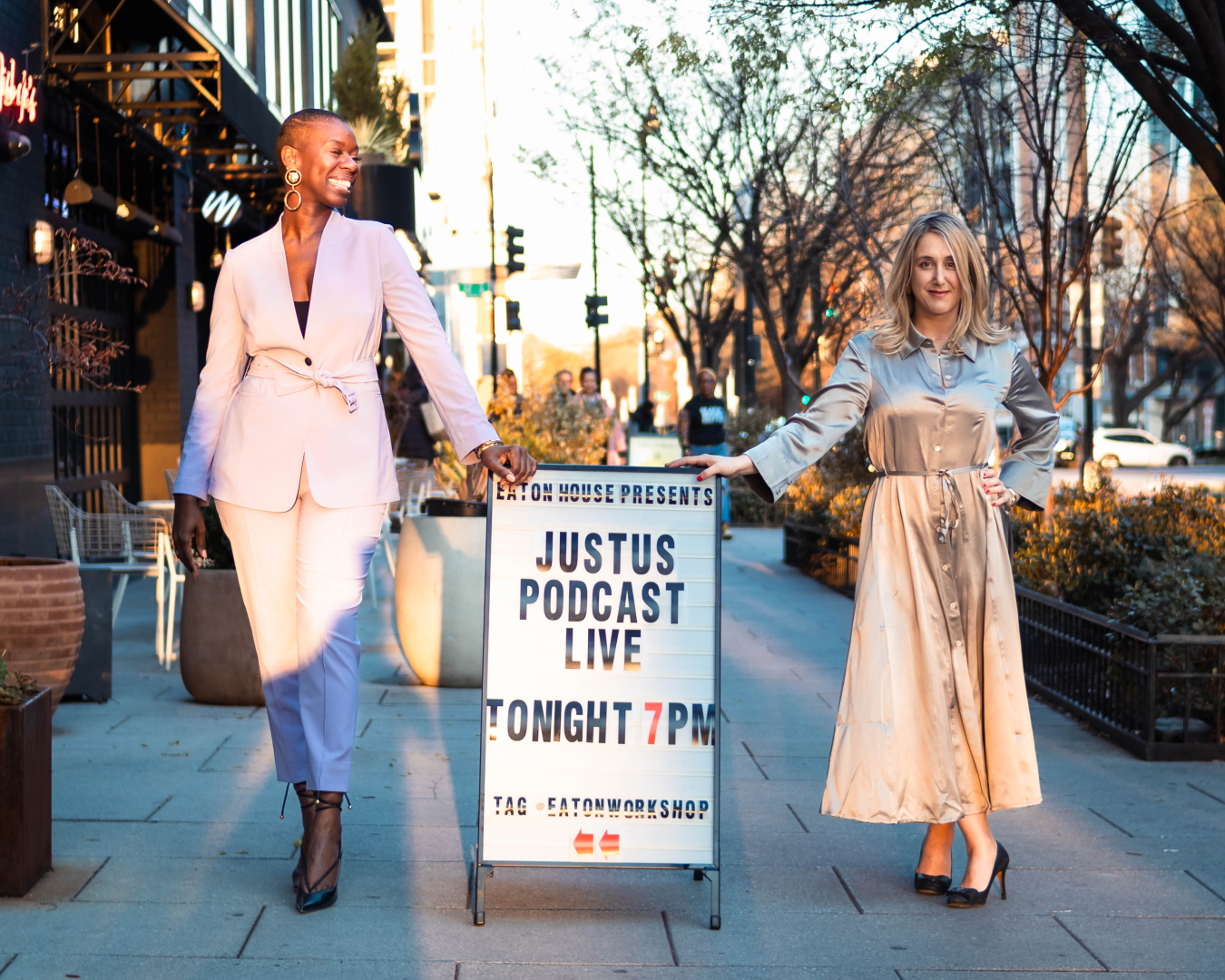
As multifaceted women and former attorneys, hosts Tashira Halyard and Margo Lindauer are experts at discussing thorny subjects with a generous amount of insight, vulnerability, and humor. We wish our entire community could attend each and every one of their truly electric events—and hear their voices firsthand—so we’re inviting you to catch their recent podcast episode on YouTube or Apple podcasts. Low on time? Scroll to see a few highlights from their conversation below.
The below conversation has been edited for length and clarity.
Want more M Dash?
Sign up for our weekly newsletter.
Thank you!
On making a major career pivot…
MARGO: At the beginning part of my career, I was willing to give everything of myself for it. I was a lawyer and transitioned into clinical teaching. I applied to a dream job at Georgetown that I did not get and was heartbroken.
My husband and I had decided to take a delayed honeymoon backpacking in Asia. I looked at my email one day, and Georgetown had emailed me saying, “We’ve been trying to get in touch with you. You weren’t answering your phone. The fellow that we hired fell through. Are you still interested in this job?”
I interviewed that day from an internet cafe in Phnom Penh. My husband was crouched in the corner holding up flashcards on which I’d written some talking points. I got the job, and we flew home early. I packed up, left him in Boston, and moved to D.C. This is what I had been working for; this is what I had been dreaming of. The first day there, I met Tashira. And to be clear, I did not think anything of leaving my home, my city, husband, my community, my family and decided to do a pregnancy partially alone.
TASHIRA: I joke about this often, but I’m a really bad employee. In some ways, I have been quitting a job or two my entire life. The longest job I’ve ever had is @politicsandfshn.
I knew when I got breast cancer that it was time to do something different. I’m a third-generation breast cancer survivor, and my mother and I were both in treatment at the same time. I also had a devastating family tragedy occur—my young cousin, who was like my nephew, passed away—and it all just hit me that there was something markedly off with my entire existence. I decided that I was going to do something radically different, and the only thing I knew that I loved was fashion. And so, I printed out some resumes.
I was bald from chemo, and on a day that I felt good enough, I went out and passed out these resumes. I got a call back from Saint Laurent six months later. That was how I first quit public policy and went into fashion. While there, I was able to build up my consulting practice on the side and eventually left to consult and create digital content full time.


On feeling lost…
MARGO: Both Tashira and I have been in therapy for a long time, and we both journal. Having a guiding statement can be really helpful, too—something as simple as, “I want to wake up on a Sunday and not have heart palpitations.” From there, you can ask yourself, “How am I going to set myself up so that Sunday night, I’m not dreading going to work on Monday? Is that possible in my current situation?”
Also, ask yourself what behaviors will aid you in getting there. Is that social engagement or no social engagement? Is that moving your body or resting your body? Is that cleaning your house or not cleaning your house? This looks different for everyone.
TASHIRA: I’ve had business coaching in addition to therapy, and all of that has helped me to get to the root of my unhappiness at work. Investing in yourself is invaluable. Like Margo said, I think it’s really important to develop a guiding principle or thesis statement that guides you.

On breaking up with rigid identities…
MARGO: The biggest things that I’ve quit were my careers as a lawyer and a law professor, but some of the hardest things to quit have been tied to identity—specifically as a working mother and woman in a very particular way. I’ve learned I don’t have to be everyone in my life’s savior and mother. I mean, I am the mother of my three daughters, but I’m trying to limit it to those three girls. I’ve also quit being everyone’s best friend.
These were patterns that kept showing up and weren’t serving me or the people that I loved in the ways I was hoping they would. I was not the friend or partner I wanted to be. And I was not taking care of myself. I’ve done a look of work to get to this place, but now, I don’t see setting boundaries as saying that you no longer want to serve people or help people that you love. It’s more that it’s not your job alone to fix everyone else’s problems. Because you cannot. It is just not possible.
TASHIRA: I’ve definitely taken a step back from taking everything on in others’ lives as well. I’m now starting to realize that I don’t have to be the savior to everyone in my life. I definitely quit that in my romantic relationships, but I think in my friendships and my family, I’m still struggling. I need to give myself a little bit more grace when I feel like maybe I’m not setting a hard enough boundary, because this is all a process. It doesn’t have to be all or nothing.







